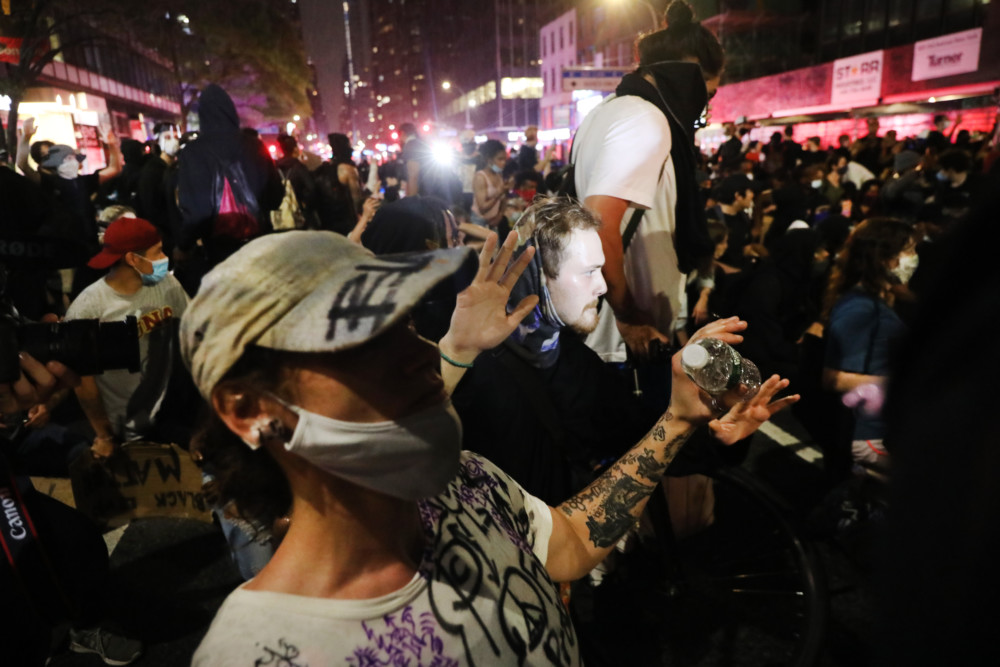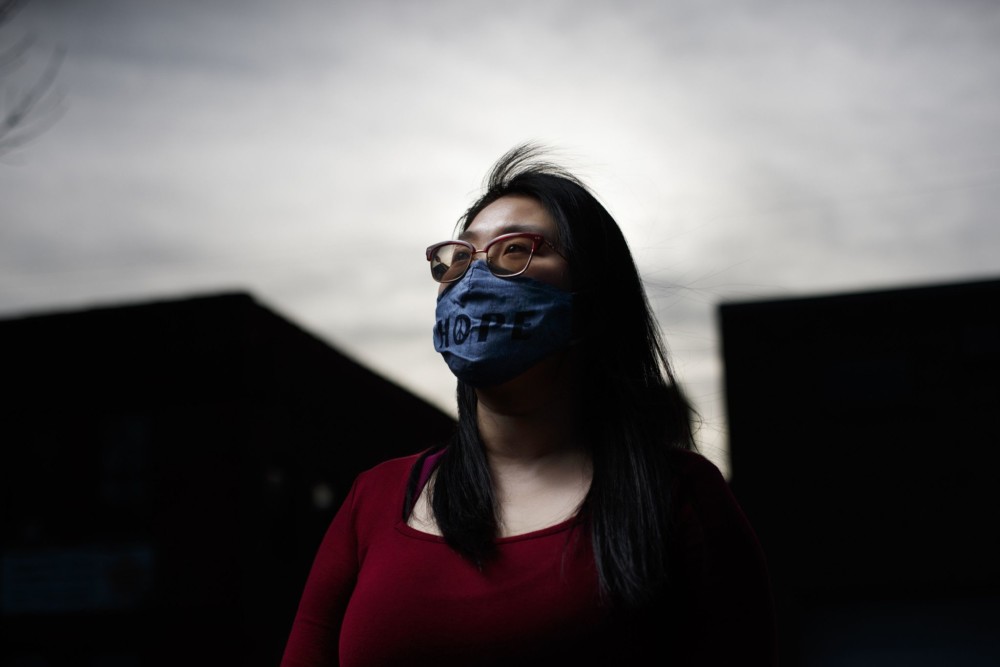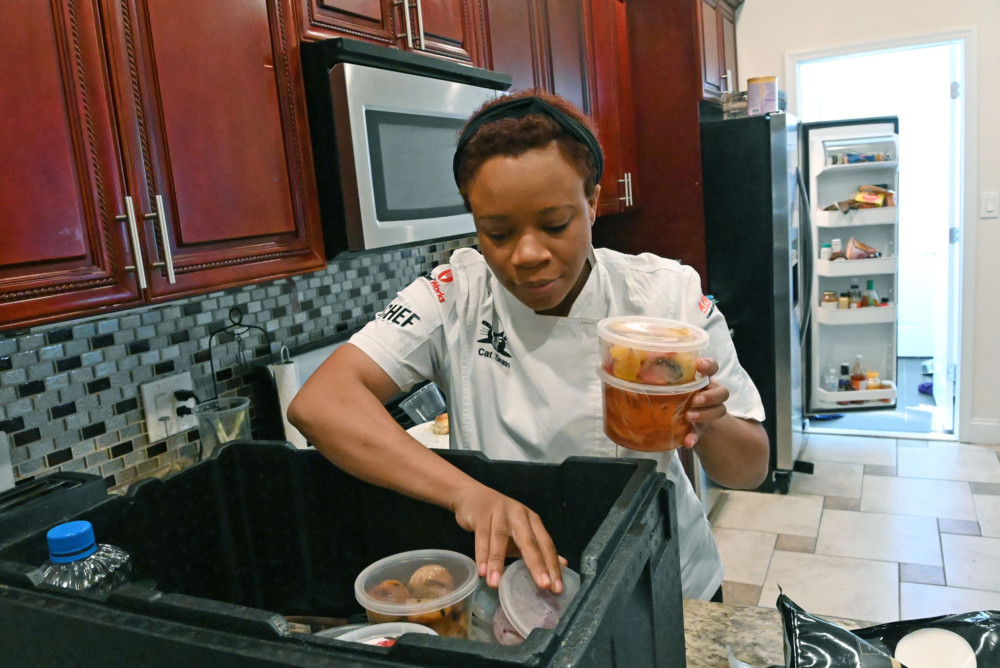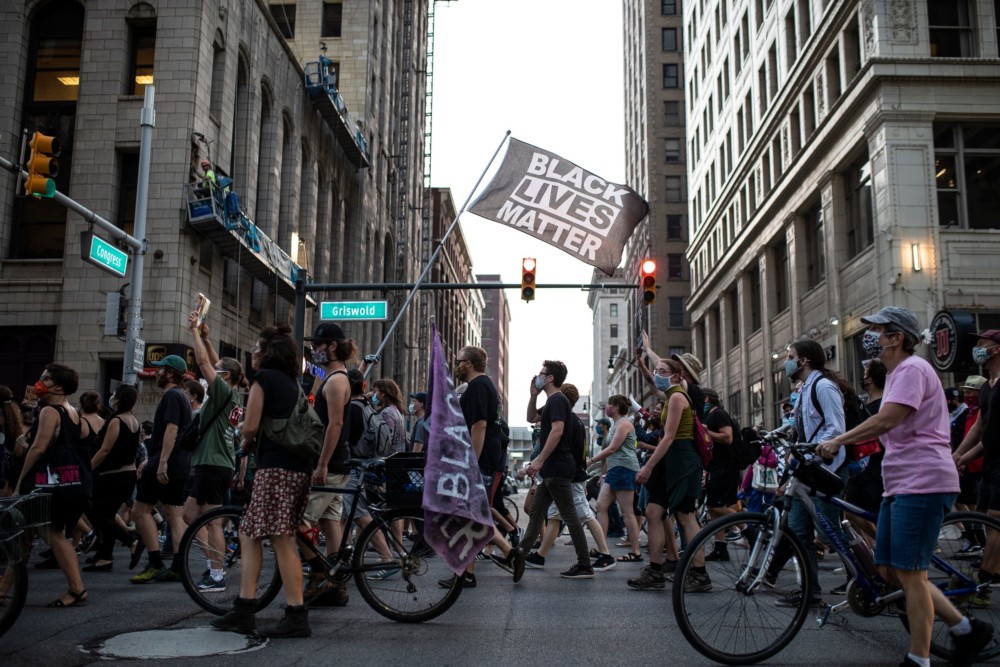By Kristina Davis
The San Diego Union-Tribune
WWR Article Summary (tl;dr) Frank Harris III, a professor at San Diego State University focuses on historically underserved and underrepresented populations in higher education. He says that besides standing in solidarity with people of color, being a white ally means speaking up when people of color aren’t around.
San Diego
For the past few weeks, many black people have noticed their phones lighting up a little bit more.
White friends, coworkers and acquaintances are checking up in the aftermath of George Floyd’s death. And oftentimes, the “how are you doing” question is followed by another: “How can I help?”
Their advice: Just start.
“One of the first things that came to mind was #ThisTimeItsWhitePeoplesWork,” said Jimmer Bolden, a black member of The Unity Center, who has been helping lead dialogues with white congregants who want to be allies in the fight against racism.
“It’s always been black people’s work to help black people forge ahead and overcome racism,” he said.
Floyd’s death under the knee of a White police officer, caught on camera for the world to see, set off historic nationwide protests that have intensified awareness around not only police violence but persistent systemic racism.
“That video put in the face of America exactly what black people have been saying for so long,” said Lisa McClendon, a Scripps Ranch resident, who is black.
A CNN/SRRS poll conducted this month indicates more white people are listening.
Sixty% of non-Hispanic Whites who were surveyed characterized racism as a big problem and 27% somewhat of a problem. That’s a shift from CNN/Kaiser Family Foundation polls that suggested White people were less troubled by racism in 2011 and 2015, with more viewing it then as somewhat of a problem rather than a big problem.
“It feels different this time,” Bolden said of the current wave of activism. “The biggest thing I’m encouraged by is the diversity of voices speaking up.”
How does someone become an effective anti-racist ally?
Black and white people who work in this area have a few suggestions.
Listen
The Rev. Wendy Craig-Purcell, who launched white ally groups at The Unity Center, a faith-diverse congregation in Miramar, challenges white people to listen to the lived experiences of people of color.
“It’s about being willing to open our eyes and see,” said the spiritual leader, who is white. “Their lived experiences are not the same as my lived experience.”
These should be personal conversations, when possible, not with strangers or fringe acquaintances, but black people with whom there is some relationship. It may still be awkward at first.
Craig-Purcell recommends a humble approach: “It can be very disarming to say, ‘I’m going to take a risk here. I’m outraged by what I see, I realize there’s a lot I don’t know and didn’t know. If you’re willing to talk to me, I’d like to hear about your experience.'”
Not everyone will respond to the invitation the same.
“Don’t be too sensitive about what you might get back in terms of anger or fear or sadness or despair,” Bolden advised.
But many black people are feeling like they are finally being heard and are ready to share. People like McClendon, an IT specialist for an executive management firm and member of the Unity dialogue group.
“Previously, I didn’t feel like anybody was interested in hearing,” said McClendon. “I’ve had so much compressed and pushed down for so long.”
If someone asked Bolden, who works as vice president of real estate for a smoothie franchise, about his lived experience, he might share about what it was like growing up in a small, largely white town in western New York, attending a majority white university and navigating a career in white-dominated industries.
“I have to make sure white people are comfortable with me so that I don’t miss an opportunity to advance,” Bolden shared.
“I was walking in Burbank and a woman starts clutching her purse when she sees me,” he recalled. “It’s like ‘Lady, I’m going to be the first one to help you if someone grabs your purse.’
“Those things wear on you. White people, try to put yourself in my shoes and imagine what it feels like, day in, day out, day in, day out. Black people aren’t imagining these things.”
For white people, feelings of guilt and shame may bubble up with increased racial awareness, but Bolden advises to “let it go.”
“That’s not going to help any of us,” said Bolden.
Beyond asking about personal experiences, white people are advised to be cautious about asking for guidance in their own journeys toward racial awareness and action.
“Be really careful about putting the burden of educating yourself on them,” Craig-Purcell said of the black community’s role. “This is our work to do as white people.”
Learn
Blatant racism is easier to recognize and call out for what it is.
But that’s not all that white people are being called upon to understand and confront.
“Commit to understanding what microaggressions and unconscious bias are,” said Frank Harris III, a professor at San Diego State University teaching postsecondary education. His work focuses on historically underserved and underrepresented populations in higher education.
“When people say they are experiencing racism, believe them. It’s something (white) people tend to rationalize maybe as a misunderstanding or miscommunication,” said Harris, who is black. “But it’s the subtle but consistent beneath-the-surface, off-putting comments that build up over and over and over again.”
The concept of systemic racism can also be difficult to grasp, but it’s key to understanding racism in this country.
“Understand why black people are in the position they are in because of our history here of not being able to own property, not being able to be educated, not being able to go certain places. It’s the limit of our economic potential,” Bolden said.
Bolden and others recommend diving into the subject matter deeper through books, articles, podcasts and movies, from scholarly to memoir to pop culture. There are several curated anti-racism resource lists online to explore. Some of the most recommended books about racism are currently topping out The New York Times Best Seller list for non-fiction.
Speak out
Besides standing in solidarity with people of color, being a white ally means speaking up when people of color aren’t around, Harris said.
Oftentimes, that means not turning away from difficult conversations with family or friends.
David Campt, a North Carolina-based anti-racism facilitator, who is black, developed “The White Ally Toolkit” focusing on conversation skill-building among white people. The toolkit, along with other racial literacy educators and experts such as Ibram X. Kendi, helped inform Craig-Purcell’s own white ally curriculum, which she started a few years ago.
Campt teaches white allies to use their own lived experiences to persuade other white people that unconscious bias and systemic racism is a real thing.
“You can reject a person’s ideas but it’s hard to reject their experiences,” Campt said in an interview when he visited San Diego last year.
He also suggests framing the conversation away from trigger words such as “hate” and “racist” and instead focus on unconscious biases.
“Shift the conversation away from ‘I hate those people’ to ‘maybe I don’t treat them the same,'” he said.
Bolden, who has participated in the white-ally dialogues, has found the phrase “white privilege” can also be triggering to some white people.
“White privilege doesn’t mean white people haven’t had it hard. It means the color of their skin hasn’t made it harder,” he said.
Show up
Anti-racism advocates say they’ve been encouraged by the large number of white people who’ve marched in Black Lives Matters protests over the past few weeks.
But protests aren’t for everyone, especially during the coronavirus pandemic.
There are other ways to stand in solidarity.
“Promote more diversity in your world,” McClendon urged.
Vote. Write to local representatives (“On a postcard, not email,” Craig-Purcell insisted). Support black-owned businesses. Amplify the voices of people of color on social media. Start a dialogue group. Donate to anti-racism organizations or nonprofits that uplift underserved communities.
Better yet, volunteer with such a group, said Bolden.
“Get to know people of color better firsthand,” he said.
Allies are also encouraged to seek lasting change within their own spheres of influence, whether it be at home or work.
“Understand how systemic racism plays out in your professions,” Harris suggested. That includes studying up on established research on the limited access that people of color have to housing, loans, health care, employment, education, criminal justice interventions and other social institutions.
“Ask your employer to provide space for these conversations to happen,” Harris recommended. “These are concrete things that can actually make a difference.
As white people establish their ally identity, Harris said there can be a tendency to center themselves in the work that shifts away from prioritizing the voice, needs and experiences of people of color.
“Your job is to be a voice and someone who uses white privilege in ways that eliminate barriers,” he said. “To be an ally is an act of service.”
___
Distributed by Tribune Content Agency, LLC.

















































































































































































































































































































































































